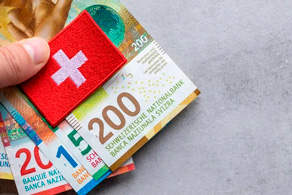What influences the Swiss franc exchange rate?
The Swiss franc is one of the most popular world currencies, and is in 6th place in terms of turnover (after USD, EUR, JPY, GBP and CNY).

Currently, the franc's share of forex turnover is around 6.5%, which is significant given the scale of the currency market.
Over the past five years, the Swiss franc has strengthened significantly against global currencies such as the dollar and the euro. This change amounted to 14% against the US dollar and 16% against the euro.
But the rate does not always move upwards; the price periodically makes corrections , so if you want to buy or sell the franc at the most favorable price, you need to know what influences the Swiss franc exchange rate.
Main factors influencing the Swiss franc exchange rate
First, let's look at the factors that cause the exchange rate to rise against other currencies.
Economic and geopolitical instability . The worse the global economic situation and the more wars, the more rapidly the franc rises.

It is not for nothing that this currency, along with gold, is called a reserve haven; the Swiss franc is bought to preserve capital, not to earn money.
That is, the worse the news, the higher the franc exchange rate and the more reasons there are to buy it.
Swiss economic growth – positive economic indicators in Switzerland stimulate demand for the Swiss currency. Such news is typically published in the economic calendar .
A trade surplus, when a country exports more goods than it buys itself, also plays a significant role here.
All factors strengthening the franc:
| Factor | Influence |
| Global crises and instability | Growing demand for safe havens |
| High exports and trade surplus | A constant influx of foreign currency into the country |
| Buying the franc as a safe haven | Growing demand from funds and central banks |
| Euro weakness | Investors shift from the euro to the franc |
| No SNB interventions | The market itself is pulling the franc up |
Facts that are reducing the value of the franc
Global economic stability – when the situation stabilizes, investors prefer to invest capital in more profitable investment options.

The end of military conflicts and economic growth leads to a weakening of the Swiss franc against major world currencies.
For example, the end of the war in Ukraine will lead to an increase in the supply of Swiss currency, which means the franc will begin to fall.
National bank interventions - when the franc becomes excessively strong, the Swiss National Bank enters the market and starts selling francs en masse.
The large supply of Swiss francs on the foreign exchange market pushes the price down and the rate drops significantly.
All factors weakening the franc:
| Factor | Influence |
| Stability and growth of the global economy | Declining demand for safe-haven currencies |
| SNB interventions | Artificial weakening of the franc |
| High stakes in the US and EU | Capital outflow from Switzerland |
| Growing risk appetite | Investors shift to stocks and cryptocurrencies |
| Decrease in export volumes | Less foreign currency inflow into the country |
In conclusion, the following conclusion can be drawn. The Swiss franc rises when global uncertainty increases and investors seek to protect their capital. It is strengthened by crises, exports, and its reputation as a reliable currency. A weakening is only possible with a calm global economy and active interventions by the Swiss National Bank.

